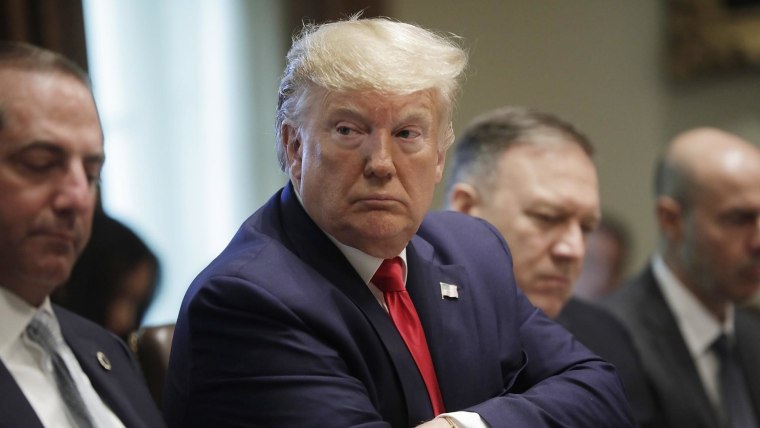Donald Trump abandoned his plan to host next year's G7 summit at one of his struggling businesses, but the president still seems pretty annoyed that his scheme fell apart. This morning, for example, the Republican continued tweeting, for no apparent reason, about how great it would've been to hold the international gathering at his Doral, Florida, golf resort.
This afternoon, as Politico reported, Trump continued whining.
President Donald Trump on Monday claimed he's receiving unfair scrutiny because of the "phony emoluments clause," as he defended his prior decision to host next year's G-7 summit at his Doral resort in Miami.Trump over the weekend reversed himself and canceled plans to hold the meeting of world leaders at his property after numerous critics questioned whether the move would violate a Constitutional clause that forbids a president from profiting from foreign governments or receiving any money from the U.S. government except his or her annual salary."You people with this phony emoluments clause," Trump said has he took questions from reporters during a Cabinet meeting.
It's worth emphasizing, whether the president realizes this or not, that his emoluments troubles pre-date his G7 gambit. There have been multiple court cases, for example, challenging Trump's D.C. hotel accepting foreign funds, which indirectly end up in the Republican's pocket.
But more important is the fact that Trump considers the emoluments clause to the Constitution "phony." That's absurd, even by 2019 standards.
Article I, Section 9 of the U.S. Constitution -- a document, incidentally, that Trump swore to preserve, protect, and defend -- states, "[N]o Person holding any Office of Profit or Trust under them, shall, without the Consent of the Congress, accept of any present, Emolument, Office, or Title, of any kind whatever, from any King, Prince, or foreign State."
The Constitution's framers took very seriously the threat of American officials being beholden to foreign powers, which is why this clause of the Constitution is more than a legal afterthought. Rather, it's a key principle of the document that created our government.
To be sure, it was relatively obscure before the Trump era, but that's largely because we haven't traditionally had many leading American officials who've tried to accept funds from foreign states.
But stepping back, there's a broader concern about the president's occasional hostility for the Constitution he has a responsibility to uphold.
Trump's White House recently argued, for example, that the congressional impeachment process, as outlined by the Constitution, is actually unconstitutional. Earlier in the year, the president and his team claimed Trump could grant himself the authority to redirect federal funds, in defiance of Congress' wishes, despite the Constitution giving Congress the power of the purse.
Even before taking office, there were some hints in this direction. In July 2016, then-candidate Trump met with GOP lawmakers on Capitol Hill, and members sought some assurances about his constitutional principles.
"I wasn't particularly impressed," then-Rep. Mark Sanford (R-S.C.) said at the time. "It was the normal stream of consciousness that's long on hyperbole and short on facts. At one point, somebody asked about Article I powers: What will you do to protect them? I think his response was, 'I want to protect Article I, Article II, Article XII,' going down the list."
The U.S. Constitution consists of seven articles. There is no Article XII.
For years, many on the right took great care to describe themselves as "constitutional conservatives." If any of them have principled concerns about the president's antics, now would be an excellent time for them to speak up.
